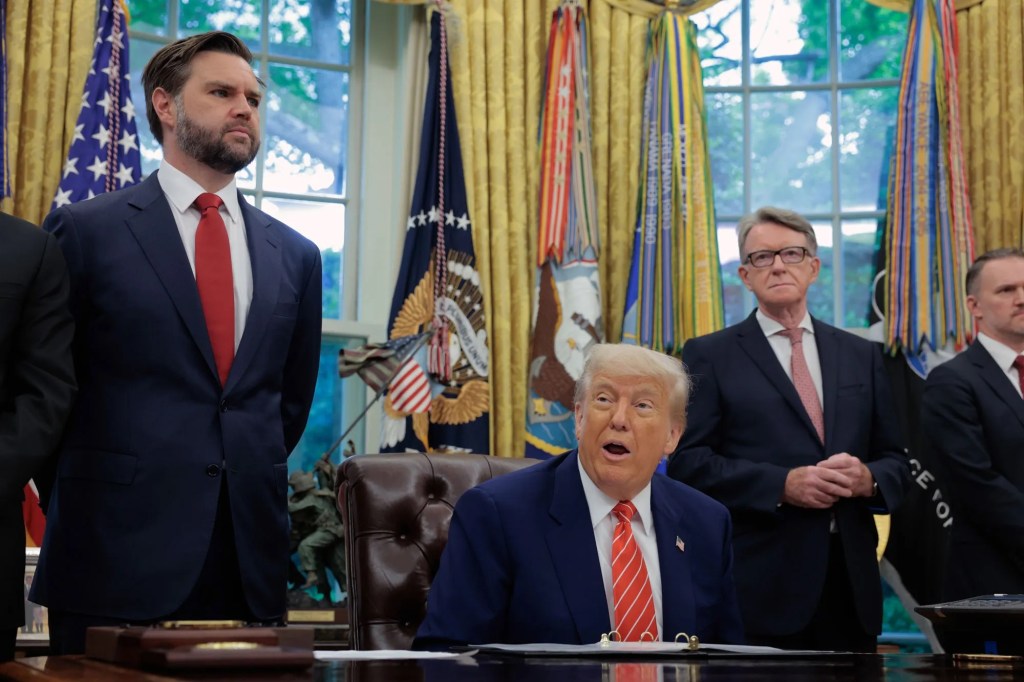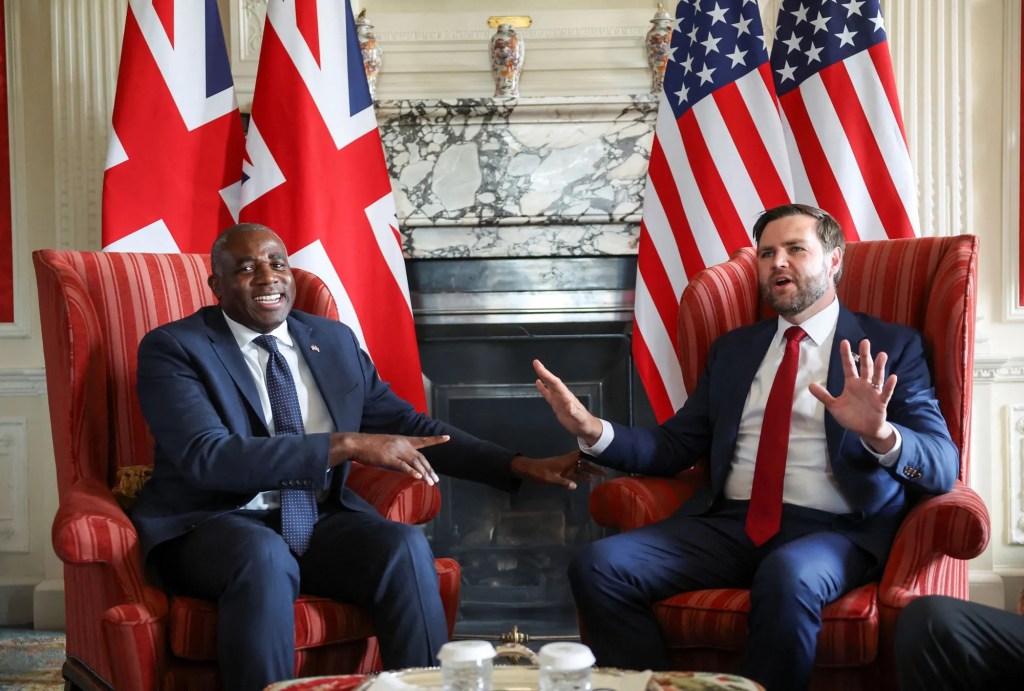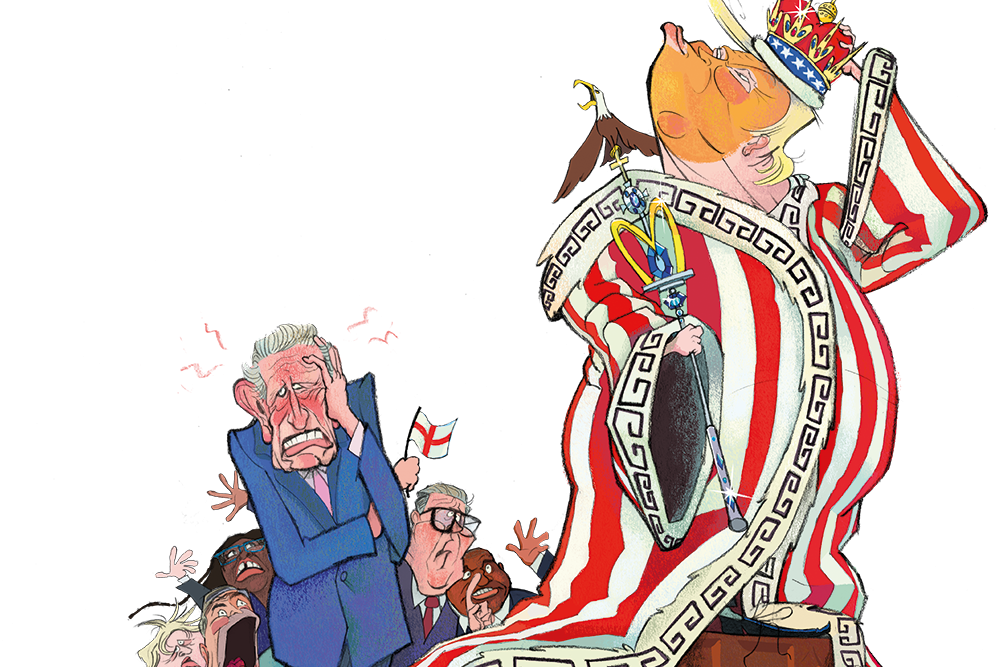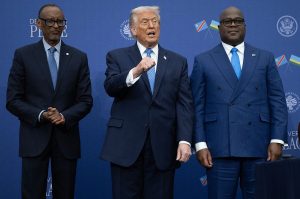The first time Donald Trump was on an official visit to the UK, in July 2018, he was deep in conversation with Theresa May during the state banquet at Blenheim Palace when his interview with the Sun dropped, offering a range of unwelcome thoughts about the then prime minister and her handling of Brexit. May’s communications team decided to let her enjoy the meal before dealing with the fallout.
When the President lands in Britain next week for another two-day jamboree of pomp and politics, Keir Starmer’s aides know what to expect. “The one thing about Trump which is entirely predictable is his unpredictability,” one ventures.
The potential landmines lie in plain sight this time – including a possible interview with GB News’s Beverley Turner. Six of Trump’s cabinet recently attended the US launch of the channel’s Washington bureau. “He likes GB News,” a British Trump whisperer explains. “But he loves Bev Turner…” As a Downing Street official observes: “He could say literally anything to GB News.”
When Turner last interviewed Trump, she pressed him to criticize growing limits to freedom of speech in the UK, an issue which is also close to the heart of J.D. Vance, the Vice President. Starmer’s decision to recognize a Palestinian state soon after Trump’s visit, the war in Ukraine and the conflict in Gaza are all areas where Downing Street and the White House are not quite on the same page.
Yet the striking thing is that British officials involved in the preparations for the visit seem sanguine about what will follow. They believe the substance and upside will far outweigh passing media squalls. They think the public is now used to Trump’s off-piste verbal excursions, which they say are “known unknowns.” Those who want Trump to join their attacks du jour on the government may be disappointed.
More fundamental to Trump than ideology is his abiding love of the deal. Recent British visitors to the White House noted with approval that on the wall of the staircase between the ground and first floors of the West Wing there now hangs a picture of Trump at the G7 summit, with Starmer peering over his shoulder, as he signed the executive order which implemented the recent trade deal with Britain. When Turner asked Trump about freedom of speech during his recent visit to Scotland, the President agreed it was an important issue but added: “I like your Prime Minister… He is a good man who got a trade deal done… It is a good deal.”
It is not the first time the online right has been disappointed by Trump’s pragmatism and periodic politeness. Claims that he would block the Chagos Islands deal and Peter Mandelson’s appointment as ambassador in Washington were both wrong. Vance’s holiday in the Cotswolds passed without incident. “We think we have an agreement to politely disagree on Palestine before the state visit,” a diplomat reveals, “which I very much hope lasts after the state visit.”

It helps that Britishness is now fashionable in Washington (where Irish origins used to be the thing to trumpet). Vance, along with other MAGA tech bros, has had his DNA tested, and discussed the results with British politicians who met him over the summer, including David Lammy, the outgoing foreign secretary, when he hosted him at Chevening. “Vance has discovered he is English,” says one of those who took part in these conversations. “He talked a lot about his roots and his ancestry. The tech-right has got very into genetic tests and Americans are discovering they’re all English.”
The big announcement next week will be a new Anglo-American tech deal which will be worth “billions of pounds of investment” to Britain at a time when the Treasury is crying out for anything which can boost growth. The deal will see more joint research and co-investment in three crucial areas: AI, quantum computing, which will hugely increase the power of AI, and nuclear fusion, which will create near limitless energy to fuel the supercomputers.
Progress has been aided by the fact that the White House is not just going through the motions. “The administration has been genuinely committed,” explains one of those involved in the negotiations. “They usually drag their feet on everything.” Insiders say that on arriving in DC, Mandelson, a prominent cheerleader for a tech deal, asked Vance to “lean into it,” which the Vice President did with gusto. After a row over encryption was resolved, Vance declared: “OK, let’s go!”
When Vance met Lammy at Chevening he spoke with passion about the possibilities. “I’ve been in lots of meetings with the Americans over the years, in which people like Vance and Jake Sullivan [Joe Biden’s national security advisor] refer to AI, quantum, biotech and fusion as millennia-defining technologies,” says one senior official. “If we can crack the computing power that will let AI transform medicine and the limitless energy needed to run it, you and I might live to 150.” Lammy, who was appointed Deputy Prime Minister in last week’s reshuffle, will deputize for Starmer at international events such as the UN General Assembly, and having developed a rapport with Vance is expected to keep talking to him weekly.
Peter Kyle, who as science minister was heavily involved in the negotiations, flew to DC this week in his new brief in charge of business and trade to try to finalize some of the details. Attempts are also under way to get some tweaks to US tariffs on Britain, something Kyle took up in his first meetings with Howard Lutnick, the commerce secretary, and Jamieson Greer, the US trade representative.

The case for the deal was outlined in a speech by the omnipresent (until this week) Mandelson at Ditchley Park last week. He pitched it as a way for the western allies to fight a global power struggle with China and its autocratic allies. “China is racing to dominate artificial intelligence, quantum computing and biotechnology,” he warned, arguing that a “full spectrum US-UK technology partnership” was crucial for “mutual defense” and “to lift us out of the economic stagnation we have experienced over the last decade.”
The need for better cyber-security, another plank of the deal, was clearly illustrated this week with the publication of thousands of leaked documents from the office of Boris Johnson, revealing further details of his enthusiastic quest for cash. The revelations were not hugely surprising (one former cabinet colleague joked: “They hacked the wrong hard drive!”) but there is a serious point. The security services believe Johnson was hacked by Kremlin proxies as part of an attack on western politicians. “It is Russian in origin,” a senior security source reveals. The firebomb attack on Starmer’s constituency home earlier this year was also considered to have been a Russian operation.
Johnson was approached last summer by the National Cyber Security Centre, part of GCHQ, and told that his documents had been placed on a public website, but it was only this week that they made it to the media. “He’s notoriously lax about his own phone and cybersecurity,” says one security source, who’s scarred by the way in which Johnson ignored requests by intelligence chiefs and mandarins to take the issue more seriously when he was PM. Insiders say Johnson was hit by a phishing malware attack, unleashed when a female aide opened an attachment to an email.
Beyond the tech deal, the reason there is an attitude of “what will be, will be” in Downing Street about the state visit is because officials are confident that Trump is sincerely well disposed to the UK and to Starmer and is keen to show that Brexit has brought rewards to Britain (not that No. 10 will be caught spouting that line). When Nigel Farage met Trump in the Oval Office a week ago, after testifying to Congress about free speech, he concluded (somewhat to his distress) that the President “genuinely likes Starmer.” Farage also found Trump relaxed and upbeat. “He’s in a very good mood because he’s got no opposition,” the Reform leader told one associate. “The Democrats are in such a mess.”
Trump and Melania, the First Lady, are “very excited” about staying at Windsor Castle, where the state banquet will be held on Wednesday evening in St. George’s Hall and Trump will be greeted by a guard of honor. When Farage last saw Trump he gave him a history lesson on Windsor Castle, the residence most beloved by senior royals.
Wednesday will be all style while Thursday brings the substance. Trump will travel to Chequers for a working lunch and a mid-afternoon press conference – another moment which could be love-in or landmine. “Private time,” when Starmer and his wife Victoria will entertain Trump and Melania, has also been worked in. In 2018, Trump was feted at Blenheim, Winston Churchill’s birthplace. This time, the President will visit the Hawtrey Room at Chequers, where Churchill recorded many of his wartime radio speeches. A senior No. 10 source says: “Winston Churchill’s legacy will feature prominently – not as nostalgia, but as a reminder of leadership during uncertain times. We want this visit to set a new standard for how modern diplomacy looks: respectful of tradition, but relentlessly focused on outcomes.”
Starmer will privately stress the UK’s continuing viability as a military partner for the US, emphasizing the worth of the Aukus defense deal with Australia, which has been questioned in Washington. There is talk of a military flypast to reinforce this image for Trump. Also up for discussion will be the future of western support for Ukraine, following the failure of Trump’s push for peace with Vladimir Putin. Starmer will talk to Trump about introducing further sanctions on Moscow and how to pressure the Europeans into releasing frozen Russian assets to fund Ukraine’s war effort, though aides caution against any major announcement next week.
The only thing missing from the visit will be a round of golf. (Trump claims to have a handicap of two, but a regular British golfing partner says: “He plays off eight or nine.”) Starmer has no ability at, or interest in, the sport, and the best golfer in the cabinet is the very un-Trump-like Lord Hermer, the attorney general (though colleagues say the recent arrival in No. 10 of Tim Allan as communications director means Hermer is no longer the best golfer in the government). Remarkably, chatter on the Foreign Office grapevine reveals that Hermer once (presumably jokingly) volunteered his services to Mandelson as a “potential golfing partner” to butter up the President.
It is this column’s loss that the offer was not taken up, but probably Britain’s gain. Whatever Trump says this week, Starmer intends to focus on the positives. If the tech deal helps to kickstart the economy, it won’t matter if the President’s apparent tendresse for Beverley Turner coaxes him into being indiscreet about other subjects.

























